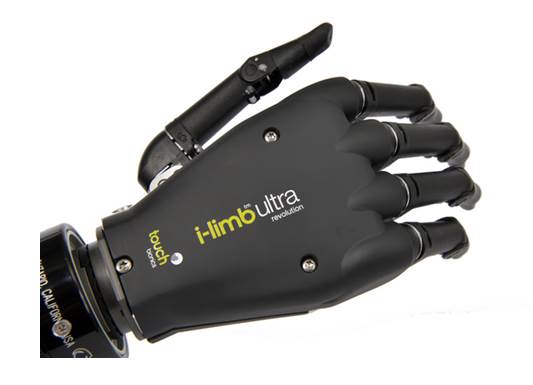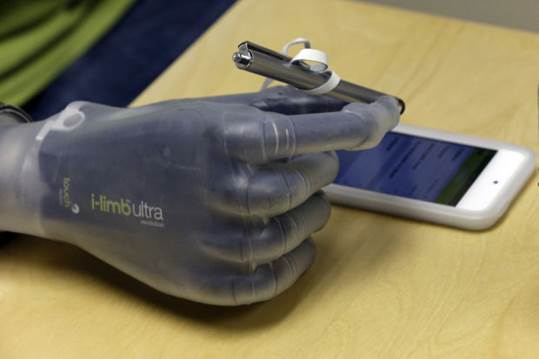Nicola Wilding’s story
Someone else who is all too familiar with
the sudden loss of independence that can be brought on by a debilitating injury
is Nicola Wilding, a British woman whose car crash thirteen years ago left her
with a frank choice. As she retold years later the accident that resulted in
the loss of the use of her right arm: “In the impact I brought my arm up to
protect my head and it’s pulled the nerves and the shoulder back. I broke the
bones straight across – compound fractures I think here and here.”
Despite careful medical care helping to
ensure the healing of her flash and bone, Wilding’s arm was crippled,
dramatically changing her life. Some movement to her upper arm has been
restored by nerve implants, but if she wants any greater functionality from
this part of her body, it will take rather more drastic measures to achieve it.
Having already been told that she would never again be able to use her hand, Wilding’s
imagination was fired when she saw a BBC Newsnight film on the work of Austrian
surgeon Oskar Aszmann.

iDevices…helping
to bring prosthetics into the 21st century
The end result is that she would now like
to have her hand cut off so that she can replace it with a bionic prosthesis.
The film showed that Austrian resident Milo had opted for such a measure,
elective amputation, with his own withered hand being replaced with a
prosthesis. Also featured in the film was the first person to undergo the
procedure, Patrick. His display of what he could do with his own bionic hand –
including tying his shoelaces and opening bottles – only further increased the
sense of urgency in Nicola to get in touch with Mr. Aszmann.
When the surgeon visited London to give a
lecture on his work to doctors at St Thomas’ Hospital, he and Nicola finally
had the chance to meet. An initial consultation took place there, with Aszmann
concluding afterwards that Nicola was a good candidate – although he also
warned of the irreversibility of the decision of elective amputation. Even
after going to Vienna so that thorough tests can be conducted on her, she will
have to wait to ensure that she qualifies for the procedure – and then, there’s
not only the surgery, but also the lifetime of prosthetic hands and maintenance
for which she will need to raise the money.
Still, Nicola is eager to take her chance
of regaining a functional hand and arm, as acknowledged by Aszmann, who has
described her as “already ready to go”. Wilding herself, meanwhile, has spoken
of her fear that she’ll “feel that I’ve let myself down… if the possibility is
there and I feel that I haven’t gone through with that.”
iDevices…helping to bring
prosthetics into the 21st century
Procedures like that sought by Nicola
Wilding, as well as the actual bionic hands already been used by the likes of
Jason Koger, are at the center of the expanding role that iOS and iDevices are
taking in boosting the mobility and independence of those with a requirement
for prosthetics, in the process immeasurably increasing the quality of their
lives. These procedures and associated equipment are about something far more
fundamental than the gimmickry with which many may associate the iPhone or
iPad.

These
procedures and associated equipment are about something far more fundamental
than the gimmickry with which many may associate the iPhone or iPad
A decision as drastic as that set to be
made by Nicola Wilding may seem like a great sacrifice, but given her own
struggles with the most everyday tasks - telling BBC News of having to use her
teeth to open bottles and needing to have meals prepared for her – coupled with
those of millions of other amputees across the world, it may not seem so
illogical.
Some medical and bioethics experts have
warned against such a permanent measure as elective amputation, suggesting that
the chance remains of an organic solution later being found. However, the
elation of the small group of people who have already undergone the procedure
at regaining basic hand use is clear to see. With bionic hands like the i-limb
being able to pick up objects while still not exerting so much force as to
break them, it’s obvious that prosthetics are becoming generally much more
advanced.
The i-limb ultra’s complete range of features,
in fact, includes not only the unique biosim software, but also the likes of a
patent-pending vari-grip mode that allows for variable digit-by-digit grip
strength, gesture selection that allows for the creation of various custom
gestures, three new tripod grips for enhanced user flexibility and an auto
grasp feature to prevent objects slipping. Also included in the package is
dedicated clinical support for prosphetists and therapists and a two-year
standard warranty.
The recent Boston Marathon bombing only
further highlights how assistance for amputees in their daily lives will become
a more relevant issue. The incorporation of such a now-widespread thing as the
iOS app into the wider strategy for amputees is therefore, in many ways, simply
a logical next step, making the most of the latest advances in mobile and
prosthetic innovation.